ADVANCING BASIC EDUCATION IN THE PHILIPPINES (ABC+)
Mid-term Performance Evaluation Report
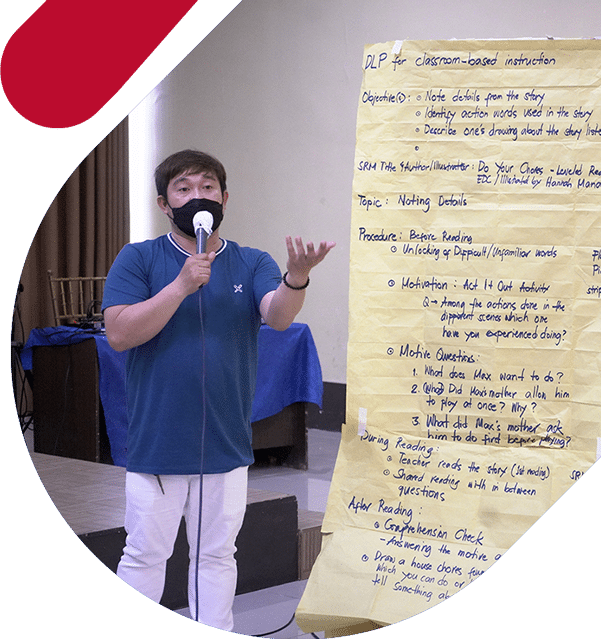
SUSTAINABILITY
Sustainability: Evaluation Question
Will the achievements in improved early-grade reading, math, and social and emotional skills for children in early grades persist after the project’s conclusion?
To gauge if the achievements in improved early-grade reading, math, and social and emotional skills for children will persist beyond the project, the sustainability milestone of ABC+ was reviewed and analyzed based on the findings and core principles of sustainability, namely: human, economic, social, and environment.


The Years 1–5 plans were revisited, including the IRs and KPIs, to decide if the set goals were achieved and, if not, what alternative plans of action were made to achieve the goals (unexpected outcomes). A plan of action (i.e., local strategies and activities spearheaded by DepEd and ABC+ in collaboration with stakeholders) was undertaken in the context of the COVID-19 pandemic. Indeed, the pandemic was a great challenge to ABC+ and DepEd to ascertain the program’s sustainability from the program’s start-up to midline evaluation because ABC+ has a limited timeline of five years.





Figure 3 shows the early-grade ecosystem toward resilience and sustainability during the implementation of the ABC+ program amidst the pandemic. ABC+ and DepEd collaboration and partnership with agencies and community to promote and achieve target early-grade literacy is about core principles of sustainability (i.e., human, social, economic, and environmental).
In the human aspect of sustainability, the project supplied technical assistance for teachers through focal persons (the proper communication and monitoring of expectations from division to school) and training of trainers (technical assistance from the regional level to division and district levels). The continuous implementation of physical and online learning to learn about and develop adaptive teaching strategies and classroom assessments also contributed to sustainability. Furthermore, the pre-service training preparation given by the identified TEIs in their respective region continuously contextualized the development of teaching and learning materials based on context. Training pre-service teachers is a succession model for DepEd in-service teachers to guarantee many well-trained in-service teachers.
The social aspect of sustainability is manifested through partnerships with HLPs and community stakeholders (i.e., B/LGU, NGOs, the private sector, etc.). ABC+ trained parents and community members/volunteers from barangays who will serve as a trainer of trainers to promote and use Parents and Community Session Guides to build the capacity of the parents and community members (i.e., barangay-based organizations of youth, the elderly, women, parents volunteers, and barangay officials and volunteers). In addition, ABC+ partnered with the Department of the Interior and Local Government Academy (DILG-LGA) to develop a model for Early-grade Literacy education governance to capacitate local communities.
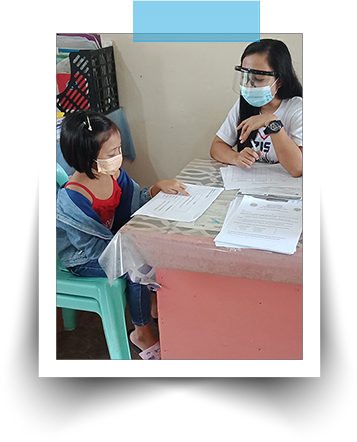
The economic aspect of sustainability is seen in the continuous production, printing, and usability of quality-assured SRMs and the accessibility of platforms such as TV, radio, and social media. Inventory of equipment for all the schools managed by the LGU will provide helpful information to decide which schools require an additional budget for the production and supply of SRMs to ensure that the reading practices of K-3 learners are well supported.
ABC+, DepEd, and NEAP utilized cost-effective strategies: 1) the use of CRLA to develop Learning Recovery programs and Literacy Developments programs in three regions (Regions V and VI and BARMM); 2) the migration of modules from the Teacher Professional Development programs to DepEd Professional Development and Learning Management System, making them more accessible to many; 3) continuous development of SRMs that have been stored to the Learning Portal for future utilization; and 4) the use of Learn Kernel as another intervention for ABC + Beginning Reading Program.
The environmental aspect of sustainability refers to creating safe learning spaces like community reading centers, learning hubs, and reading and numeracy corners inside the classroom. ABC+ supported DepEd to establish and gain support from the local community and mobilized them to develop learning hubs and community reading centers/learning centers to create a good learning environment. Inclusivity and building resilience also contribute to sustainability, mainly by protecting the learning resources developed. It is also important to acknowledge the role of all stakeholders, from top agencies down to grassroots levels, given the numerous challenges such as environmental disaster risks (climate change, typhoons, flooding, landslides, earthquakes, and volcanic eruptions), as well as geographic and political-economic factors (far and remote school, limited livelihood, malnutrition among learners).
Based on the evaluation data, the team found sustainability mechanisms that will likely support improved EGR and literacy beyond the program’s life. See Table 6.
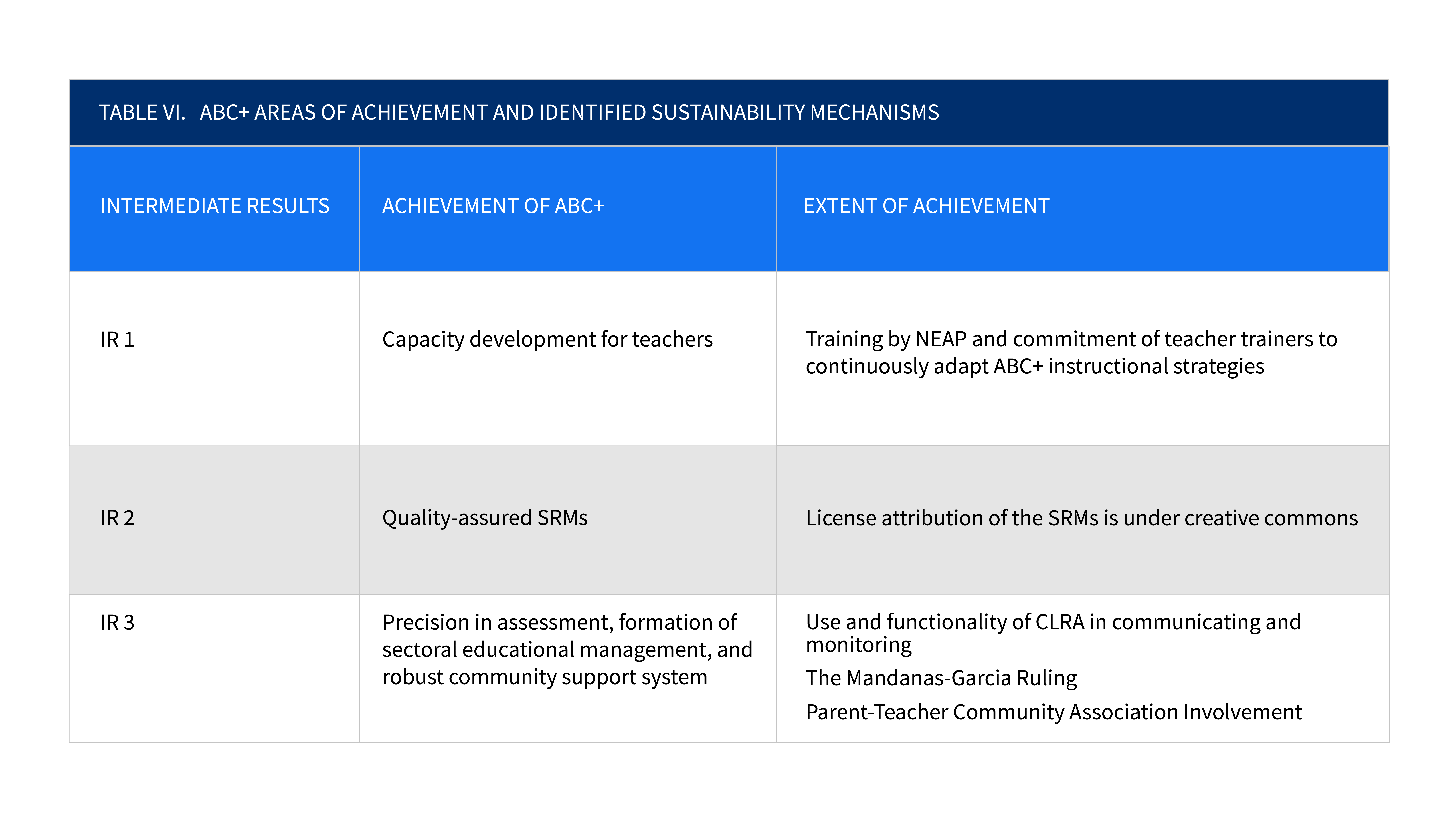
Under IR1, collaboration with NEAP is an excellent mechanism to adapt the ABC+ program continuously. Many teachers appreciated ABC+ training, which helped them improve their literacy instruction. Informants explained, “The Professional Development Information Technical Assistance provided for NEAP is a good start, and DepEd is adopting the system.” Another informant stated, “The training is NEAP-certified and Philippine Regulatory Commission-recognized. One of the directions is to build up the capacities of the division trainers of Negros Occidental and other Schools Division Offices so that they will be given NEAP-Regional recognition as Regional Learning Facilitators on the ABC+ training program and other programs intended for K-3 teachers.” Based on these statements, ABC+, in collaboration with NEAP, showed significant improvement in teacher professional development. At the same time, ABC+ focal persons, teachers, and informants saw the long-term importance of capacitating the teachers through professional development. The instructional approaches and strategies they acquired through training were of immense help to them as a teacher and for improving early-grade literacy.
Under IR2, the creative commons as the license attribution, where program recipients may distribute copyrighted SRMs freely, were helpful to many teachers and parents. Teachers could easily access and reproduce the SRMs. Likewise, parents recognized the value of these learning materials. During the KII, one of the informants stated, “In the future, we can sustain the ABC+ development materials,” while another mentioned that “I printed out reading materials and let the students read them; if they were able to read the materials, I gave them stamps depending on the number of words they’ve read.”
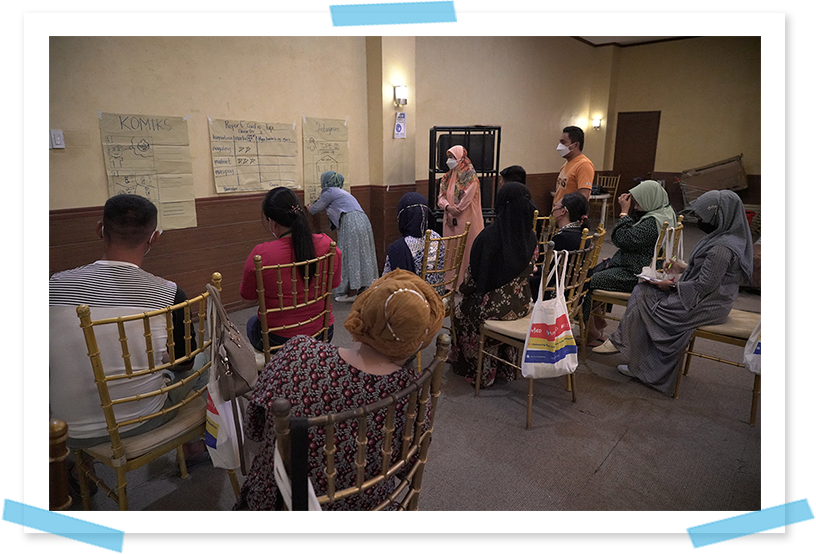
Under IR3, teachers and school heads proved the remarkable functionality of CRLA in many participating schools from Regions V and VI and selected school districts in BARMM. If this initiative introduced by ABC+ in collaboration with DepEd continues, this would be a positive indication of the program’s sustainability.
Given the relevance of the policies and effectiveness of training, teaching, and learning materials, how to continuously finance the program will be one of the biggest challenges after the conclusion of the ABC+ program. DepEd adaptation and mainstreaming of ABC+ interventions would ensure their inclusion in the DepEd and local government budgets and their sustainability. Based on evaluation team findings from FGDs and KIIs, ABC+ and DepEd strengthened the ongoing collaboration with provincial, district, and municipal education committees to gain financial support for training and SRM production and distribution. The education committee from the governor’s and members of Congress’ offices supported ABC+ and DepEd’s efforts to distribute and raise funds for the program. In addition, the local school board offers assistance to schools and learners through the Mandanas-Garcia ruling by giving more funds to improve school facilities and infrastructure. NGOs, alumni, and other stakeholders provided financial support and in-kind donations such as printers, bond papers, photocopying machines, small and big books, and other school supplies and kits.
During the school closure brought about by the COVID-19 pandemic, education leaders experienced limited manpower. In response, ABC+ and DepEd worked with the Parent-Teacher Community Association (PTCA) to mobilize volunteer parents, youth organizations, NGOs, and B/LGU to assist schools in reproducing and distributing learning materials. The continuous aid of PTCA, especially during the pandemic, is another robust sustainability mechanism to ensure achievements in improved early-grade reading and SEL continue. Parents, teachers, and community efforts were crucial because they directly interacted with learners. Teachers could guide parents on how to teach their children at home.
In regions V and VI, teachers, through FGDs, and school heads, through surveys, expressed their readiness to continue ABC+ activities after the project ends. Teachers articulated that they learned more strategies during the training and recognized the support of the ABC+ program. Furthermore, the survey shows that more than 50 percent of the participants answered, “strongly ready” and “ready.” See Annex 13 for more detail.
Teachers’ and school heads’ responses to the survey aligned with the identified successful elements towards sustainability, such as 1) continuous support and institutionalization on contextualized policies and memos and collaboration with stakeholders (internal and external) through MOAs and MOUs, 2) established functional data-driven planning and investment programming through strengthening the assessment systems, 3) consistent and continuous development and production of quality assured SRMs, 4) continuous innovation, implementation and monitoring of innovative programs on literacy with GESI and SEL, 5) continuous innovation in the teacher training/professional development and making it meaningful to teachers, and 6) continuous support for teachers to improve learners’ performance, a promising indication that program interventions and achievements might continue after ABC+ closes out.





The stairs in Figure 4 represent the elements of sustainability wherein the first step is considered the first element. This creates chain reactions to achieve sustainability of the ABC+ program. Once the agencies or organizations establish collaborative relationships, the intervention only needs continuous support and institutionalization of relevant contextualized policies and memos. Partnerships with external stakeholders and the private sector through Memorandums of Agreement/Understanding (MOA/MOU) were also great support systems.
One of the key informants in Region VI stated, “Our mayor also pledged his support. LSBD (Local School Board Development) funds were used as well. Signed proposal for training of teachers and parents on the proposed remedial instruction, as ideas came from the ABC+ project.”
Once policies and memos are in place, other elements will follow, such as: established functional data-driven planning and investment programming through strengthening the assessment systems through license attribution (assessment tools were ready and in place and matched with teaching and learning materials); continuous development and production of quality-assured SRMs; continuous innovation, implementation, and monitoring of literacy programs that integrated GESI and SEL at the onset; continuous innovation in teacher professional development and making this meaningful to teachers; and continuous support for teachers to improve learners’ performance.
How did ABC+ strengthen local ownership and leadership on the enhanced instruction and learning outcomes in kindergarten to Grade 3?
The peak of the COVID-19 pandemic resulted in school closures across the country. The pandemic hurt the entire education system, more specifically, its delivery. However, despite experiencing various calamities and disasters, many educators were able to innovate through technology and local communities were capacitated to provide additional support. ABC+ and DepEd central office collaborated with various local agencies on how to continue education and work around the barriers brought on by the pandemic.
As shown in Figure 5 below, DepEd regional offices could contextualize policies through memos disseminated to school divisions to innovate programs and adapt them to their context and pandemic restrictions. One of the education leaders stated, “At our level, this provided us guidance that aside from the regular work, we need to include certain activities in the budget to ensure continuity of the interventions.” This informant also noted that they “consider that newly hired teachers and teachers assigned to kindergarten to Grade 3 classes should receive the Teachers Training 1 and 2 as part of their induction program.” Each school was able to implement innovative school activities based on the needs of the learners and parents through the support of the local community.
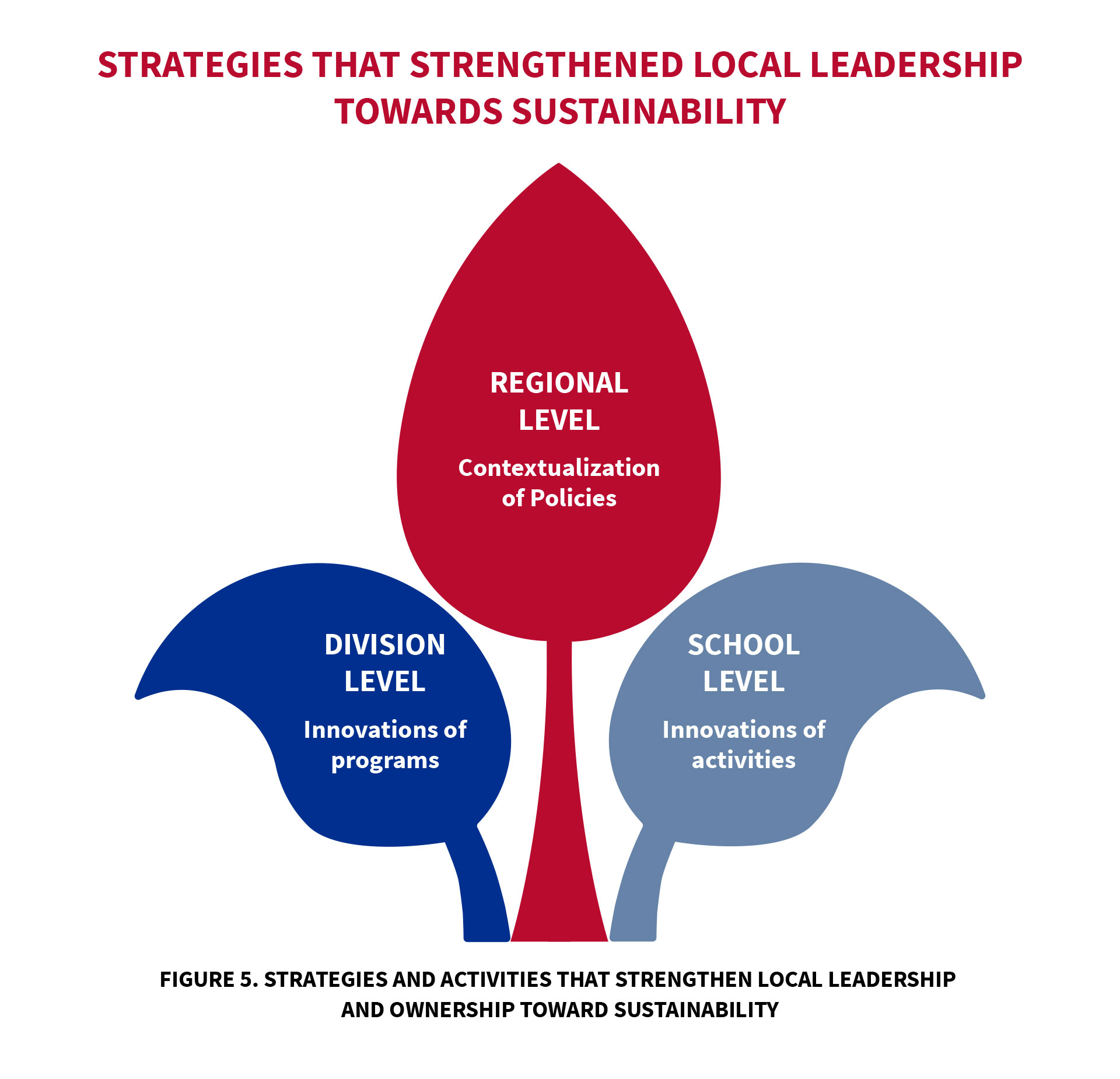




ABC+ assisted and capacitated communities through diverse local activities, as shown in Figure 5. The following activities strengthened local ownership toward sustainability:
The reflected and observed strategies and activities concurred with the survey result on the extent to which ABC+ activities involved community stakeholders (i.e., LGU, NGO, etc.) to improve early-grade instruction. Almost 50 percent of the participants (school heads) responded to this statement with “to a great extent” or “moderate extent.”


Based on the collected data and reviewed documents on ABC’s sustainability milestones, the critical indication of sustainability is the resilience built during the peak of the COVID-19 pandemic through the commitment of all education stakeholders, from DepEd to HLPs in the community. This was made possible because of ABC+ initiatives and collaboration that focused on the following:
Given the limited funds and human resources of several schools, DepEd and ABC+ collaboration with other government agencies, private sector, and community stakeholders is an excellent means to achieve continuity of the designed training program (i.e., pre-service and in-service), reproduction and distribution of SRMs, and improvement of physical infrastructure and facilities. These are future strategies that can be explored. Enhancing literacy achievement is not limited to curriculum and the four corners of the classroom; instead, it goes beyond “schooling.” It is what we call “community,” a living laboratory for and of learners where each member of the whole community plays a significant role.
The achievements in improved early grade reading and social and emotional skills for children in early grades will likely continue after the ABC+ project conclusion because of the identified mechanisms and elements that have been employed toward the achievement of sustainability. The sustainability mechanisms include 1) training by NEAP and commitment of teacher trainers to adapt ABC+ instructional strategies continuously, 2) license attribution of the SRMs is under creative commons, 3) use of CRLA in communicating and monitoring, 4) the Mandanas-Garcia Ruling, and 5) PTCA involvement.
The successful elements of sustainability are:
The community’s resilience, the adaptation of DepEd, ABC+, and other agencies to deliver education amidst the pandemic, and constructive collaboration through collaboration with TEIs, LGU, NGOs, and other stakeholders in the community also contribute to sustainability. However, there was limited collaboration with the private sector, as indicated in the five-year sustainability milestone of ABC+.
At the regional level, ABC+ and DepEd collaborate with TEIs to train pre-service teachers in preparation for their in-service tasks to support and continuously improve early grade literacies (i.e., reading and numeracy). ABC+ established local ownership and leadership, resulting in various innovative strategies and activities based on the needs and conditions of the communities. Adapting the whole community approach helped education leaders, teachers, parents, and learners build resilience to sustain the community’s practices on literacy. The concept of the whole community approach is firmly anchored on the core principles of sustainability (i.e., human, social, environmental, and economic).
To sustain the ABC+ program,